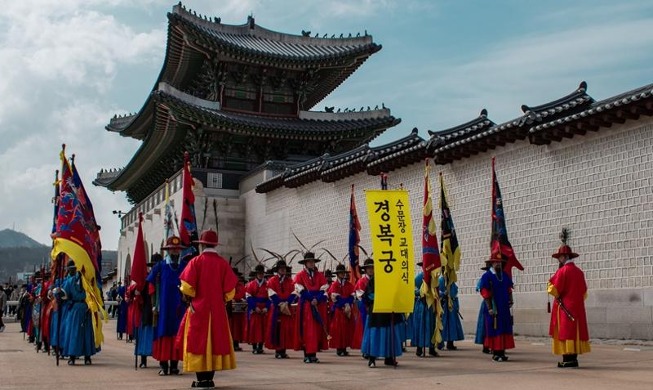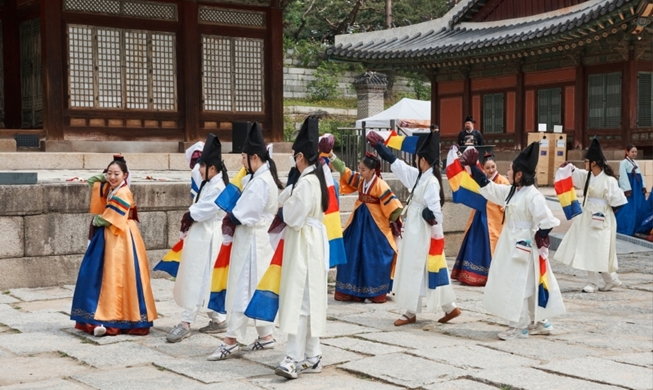-
 Korea.net's 24-hour YouTube channel
Korea.net's 24-hour YouTube channel- NEWS FOCUS
- ABOUT KOREA
- EVENTS
- RESOURCES
- GOVERNMENT
- ABOUT US
|
The Korean government has been concentrating on establishing e-government services since 1987, when it enacted laws in order to provide high-quality government services to citizens in a more convenient manner. Thanks to such ongoing efforts, Korea’s e-government systems are now being praised all around the world.
This is the sixth part of a series on the Korean government sharing its e-government systems with the world. Today we will cover Korea’s e-People online petition system. |
Case 1:
Vacation-goers made an online petition using the e-People petition system regarding the extortionate cancellation charges demanded by low-budget airlines.
Case 2:
Citizens requested an audit through e-People where they suspected that an organization concerned with wildlife protection and the prevention of illegal hunting was receiving funds from both the central and local governments for the same purpose, in a bid to prevent a waste of public funds.
Case 3:
A growing number of drivers, concerned by the need for safe driving, have used e-People to report illegal driving activity, including illegal U-turns, by submitting videos taped using their black box cameras.
Case 4:
A mother used e-People to report a good deed of a Marine Corps sergeant who saved her and her little son locked inside a crashed car despite the risk of possible engine explosion.
These are some of the reports received by the e-People online petition system. Run by the Anti-Corruption and Civil Rights Commission, this system receives about 1.7 million petitions per year from ordinary people who file complaints in various areas of daily life or make suggestions to improve the government’s policy-making procedure. The e-People system is an important online communication channel where citizens can voice their opinions, especially when they experience inconvenience or unfair treatment from administrative bodies, or wish to propose an idea for a new policy or report wasteful state budgets.
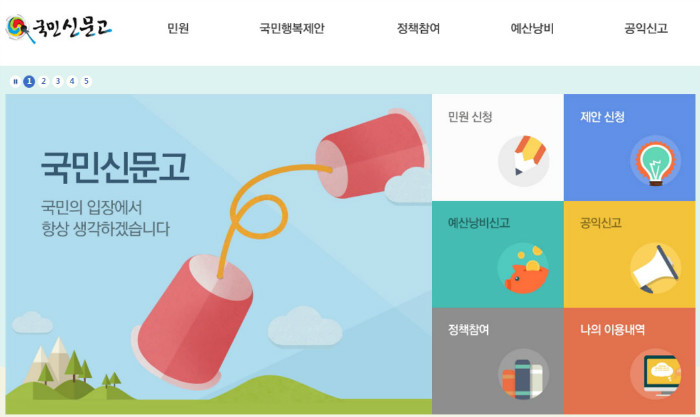
E-People is an online petition system where people can make complaints, report any unfair treatment which is against the law, voice their own views, or make suggestions for new government policy. The above shows the e-People homepage.
The Korean name for e-People is "Gungmin Sinmungo (국민신문고, 國民申聞鼓)" which literally means "big drum of the people." The name is derived from the third ruler, of the Joseon Dynasty, King Taejong (太宗, 1367-1422). The king wanted to overcome chaos and build a stable country. He decided to hang a big drum named "Deungmungo (登聞鼓)" after listening to advice from servants who told him to follow the founder of the Song Dynasty who built a big drum to listen to the voices of commoners and apply their views to the management of state affairs. In August 1410, the king ordered to have the drum hung, later renamed "Sinmmungo." Anyone could beat the drum to raise their voice to the king when their complaints for unfair treatment remained unresolved by the local authorities of their town of residence.
Rooted in the Joseon era, the petition system still exists as a form of online petition backed by developments in information and communication technology, which enables people to voice their opinions regarding government policies.
Today’s e-People was initially developed in 2005. To fulfill the role as a communication channel for the people, the government integrated all existing communication lines run by administrative organizations designed to receive enquiries, suggestions, petitions and policy discussions. In August 2005, e-People integrated the petition management system of seven central government bodies. In February 2008, the e-People system also integrated local government entities and other public organizations in order to provide a so-called one-stop service for the people.
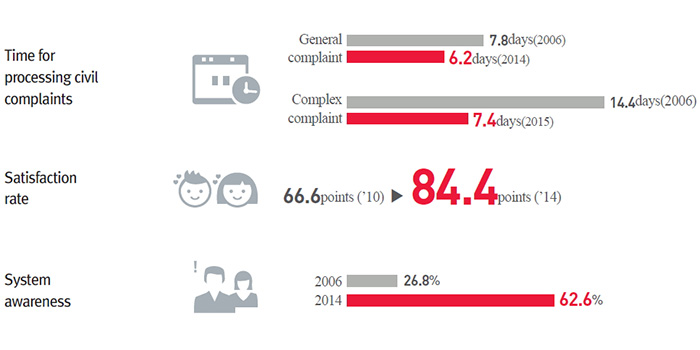
The e-People integrates more than 900 central and local government organizations and other public organizations. The number of received civil complaints and petitions is on the rise every year. Users also expressed a high level of satisfaction with the overall service, including the shortened processing time.
The e-People system can be accessed from both the Internet and mobile platforms to file civil complaints. It can also receive petitions written in other languages from non-Koreans or overseas Koreans who are more comfortable using languages other than Korean. As of December 2016, complaints can be filed in 14 languages.
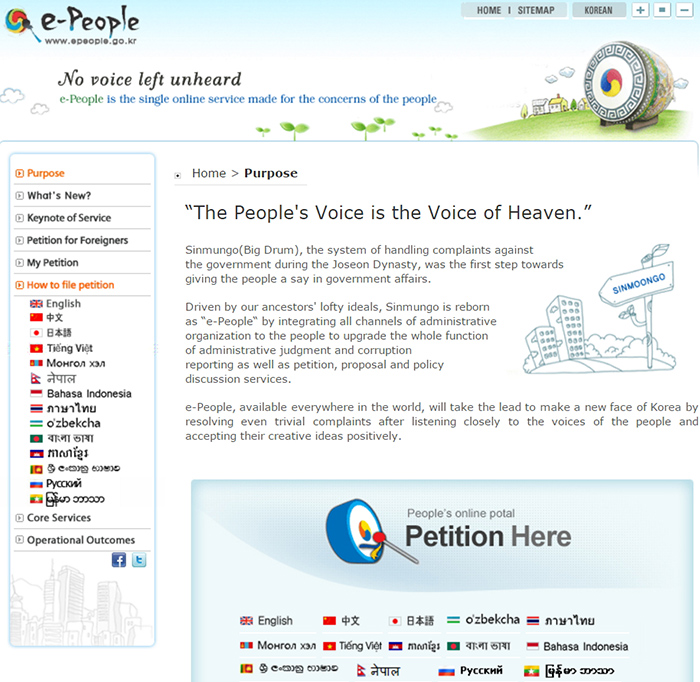
Non-Koreans can make complaints or petitions on the e-People homepage. The above is the homepage of the e-People System in English.
Once a petition has been received, it is transferred to the related department of the organization in charge of the matter, which will lead to the prevention of further damage and victims or push offending organizations to come up with countermeasures. Those who make petitions can be updated as to the progress of their matter, as well as receive information on the overall procedure.
The latest ICT development helped shorten the petition processing time. Currently, it takes about 6.2 days to complete the processing procedure for general complaints which used to take 7.8 days in 2006. In cases of complex complaints, it takes about 7.4 days, an improvement from 14.4 days in 2006. The shortened processing time has boosted the satisfaction index of its users from 66.6 percent in 2010 to 84.4 percent in 2014.
The civil complaints are used by the Anti-Corruption and Civil Rights Commission which conducts analysis and even takes preemptive measures. This was the case last year when more than 100 complaints were made on the e-People system about their unfair treatment regarding government subsidies related to their mobile phone communication membership. The commission raised an early alarm alerting the related government bodies -- the Ministry of, ICT and Future Planning and the Korea Communications Commission – in order to prevent recurring cases and further victims.
The commission established an information and analysis system for civil complaints in 2010 and began to provide actual service in 2013. In 2014, it introduced an early alarm system in order to actively resolve civil complaints. The commission also monitors tension and damage between groups and runs a civil complaints prediction system in order to prevent similar damage from spreading. This is illustrated by civil complaints which many people made in June about unfair practices of low-budget airlines ahead of the summer vacation. In this case, the commission informed the related government organizations so that they could make improvements and create countermeasures.
The e-People system has won recognition from around the world. It was selected to be one of the top ten winners of a French-based e-Gov contest in 2006, a year after its development in 2005. In 2011, it won the U.N. Public Service Award. The e-People system ranked the first place in the e-Participation Index of UN E-government Surveys for three consecutive times in 2010, 2012 and 2014.
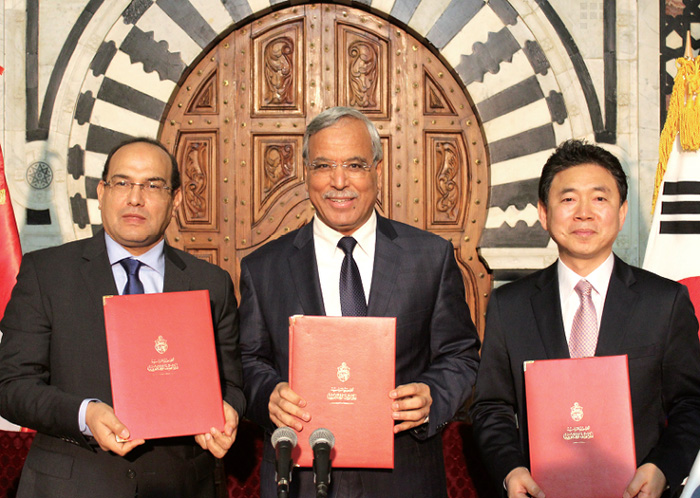
Kim Tae-Eung (right), Director General for Institutional Improvement, and Tunisian Minister of Public Services, Good Governance, and Fighting Corruption Kamel Ayadi (center) pose for photos. They signed a memorandum of understanding on cooperation of the introduction of the e-People system to Tunisia in February 2016.
Korea has been actively working together with its neighbors for the introduction of the e-People system. In February this year, the commission signed a memorandum of understanding (MOU) with the Tunisian government for the cooperation and the introduction of the e-People system to Tunisia. The commission also signed another MOU with the Tunisian Ministry of Public Services, Good Governance, and Fighting Corruption about information sharing. Under the MOU, the two sides agreed to host expert exchanges in order to extend civil participation and bolster capability for anti-corruption, and share system, laws and technology for the introduction of the e-People system to Tunisia.
The commission is also consulting with Indonesia for the introduction of the e-People system. It has been working closely with Indonesia since 2006 when the two governments signed an MOU on anti-corruption cooperation. These days, the two sides have been taking necessary steps since the Indonesian government called for Korea to carry out a project for the introduction of the e-People system in Indonesia.
In May 2016, when Indonesian President Joko Widodo visited Korea, the two governments signed another MOU to extend the existing cooperation MOU on anti-corruption. Both governments agreed to strengthen cooperation by sharing excellent cases and policies in anti-corruption and prevention measures, technology support, education and training, and hosting related symposiums.
By Yoon Sojung
Korea.net Staff Writer
Photos: Anti-Corruption and Civil Rights Commission, Ministry of the Interior
arete@korea.kr




